IT has often occurred to us that the spirit of Free-masonry is not as genuinely understood and appreciated as it deserves to be. We are often in doubt whether, in practice, full effect is given to the principles we profess.
We know there is a vast amount of beneficence among Craftsmen, but we are not quite sure our good works areal ways done as retiringly and unostentatiously as they might be.
Benevolence, too, is not a quality to which the heart of the Freemason is by any means a stranger, but here, again, we are sometimes disposed to question if the benevolence is invariably pure and simple. It is, we fear, quite as often mere lip-service we render as heart-service.
The utterances we breathe are the passing compliments of the moment. It is ‘en regie’ to say pretty things to each other, and we say them.
We observe, strictly, the forms and ceremonies of polite society, but it is merely an observance, and nothing more. We are, indeed, professors of Freemasonry, but we are not adepts at illustrating the sterling value of its principles.
To a certain extent, it is our duty not to feel any surprise at this. Masons are merely men, and share, in common with all mankind, the weaknesses of human nature, but at our reception into the Craft we bind ourselves to rise superior to the weaknesses of ordinary beings, and we are not always diligent in the observance of this obligation.
We deviate frequently from the hard and fast lines laid down for our guidance. We ought to be perfect exemplars of every human virtue. We are not; we often, indeed too often, deliberately illustrate the strength of human weakness, and through passion cultivate error when it were as easy to cultivate truth.
In short, and we say it with a strong sense of humiliation, there is a vast amount of humbug about Freemasonry, and we are tolerably certain that now, when Masons are the observed of all observers, is the time to utter a few home truths.
The principles of Freemasonry are coeval with time itself. They are older than the oldest form of religion of which we read in any history. They rest on the firm basis of love—love of God the Creator and man the created. In common parlance this basis is generally known as religion and virtue.
The former is the observance of that duty we all owe to the Supreme Being. There is no uniformity in the observance of this duty. It is enough for a man to observe it becomingly. Masonry, in fact, prescribes no form of religious worship, but simply that men shall worship religiously.
The limits of virtue, the twin sister of religion, are defined, as accurately as the imperfections of our nature will permit, but no matter how we regard it, and different peoples form a different estimate of virtue—no matter, we say, how men regard it, virtue is neither more nor less than the love of our fellow-man.
This love of God, that is, religion, and love of man, that is, virtue, together form the basis of Freemasonry.
One difference between these principles is, that the religious element in Freemasonry obeys no particular law. We must all of us worship the Supreme Being, without prescription, however, as to the form of worship.
The virtuous element, equally to be observed of all, may find different forms of expression under different circumstances, but the end in view is always the same, to promote the well-being of our fellows.
All this may seem, perhaps, mere grandiloquence, mere meaningless talk. Our purpose, however, is to compare the practice of Craftsmen with the professions they make.
Love of God and love of man are the principles we profess, and confining ourselves, for the moment, to a consideration of the latter, we ask, in all sincerity,—Do we practice what we preach ? We have said beneficence is one of the virtues on which we pride ourselves. We are, as a body, beneficent, but will our motives always bear analysis?
Benevolence, again, is a quality we strive to exhibit both in season and out of season, aa the phrase runs, but are we benevolent in very truth or merely as regards mere outward form ? Are there not those who say they wish a man well, yet secretly do all they can to thwart him.
Are there among us none who steal behind and deal treacherous blows ? Are we always free and open towards each other privately as well as in the Lodge room ? Are there no quarrels and dissensions among us.
No exhibitions of bitter party feeling ? Are there not those who think far more of those outward and visible signs of Freemasonry, with which they are bedizened, than of the principles laid down in our book of Constitutions ?
The question, whether a man shall wear a particular kind of jewel is, in the eyes of many, of far greater importance than the question whether the government of our Lodges may, or may not, be improved in this or that detail.
It is, in one sense, perhaps, a matter for thankfulness that our archives are so few and have been kept so carelessly, or we imagine the history of no Lodge but would show the frequent prevalence of bickering, squabbles constantly breaking out, a narrow spirit of clicquism, or some similar short-coming, the very reverse of edifying, and worse still, indirect antagonism to the spirit of our Craft.
Some of this is to be expected, for we are men, and ‘humanum est errare’; but should this difference between our practice and precept prevail to the extent it does ? Would it prevail so largely if more heed were given to instructing the young Crafts-men as to the nature of the obligation he has formed ?
The end of Freemasonry is not the decoration of the person with jewels and ribbons. Were this the case, we should be on a level with the poor, ignorant aborigines of Africa and the Pacific islands, who will make any sacrifice in order to acquire possession of a few beads or a strip of coloured cloth.
We are told to believe the badge of a Freemason is more honourable than the badge of any order of knighthood.
Yet not a few think of little else than how and when they may wear amass of tinsel. We do not mean, of course, that decorations conferred for honourable service are despicable. We are pointing now to the silly ambition of those who care little how a decoration is won, so long as it may be worn.
Again, as to our fraternal greetings, we could often wish they had a deeper significance. It is true there is an old saying in vogue among us that charity covers a multitude of sins; but it is certainly not an act of charity—that is, an act which illustrates our love for others—when under cover of a polite fraternal address to Bro. A.B.C., we do all in our power,—it may be merely to weaken his influence, or it may be worse still,—to lower him in the just estimation of his fellows. Herein lies the humbug of Freemasonry—that we allow so much of this sham, this make-believe of a fraternal feeling to exist among us.
Simplicity is at the root, is of the very essence of Free-masonry. Principles that cannot be folded up so as to present a different aspect under different conditions, a purpose that is directed to the attainment of one object—these are the principles and the purpose of true Masonry.
We believe these prevail among us largely, but they are not as operative as they might be for the shams that crowd them in on every side. Let us rub off these, and the glories of Freemasonry will stand some chance of being loved for its own sake.
– The Freemason’s Chronicle: 12/8/1876
 The Freemasons Chronicle, a weekly record of masonic intelligence, was first published 2nd January 1875 London, England as an independent weekly journal of masonic interest and continued for 27 years.
The Freemasons Chronicle, a weekly record of masonic intelligence, was first published 2nd January 1875 London, England as an independent weekly journal of masonic interest and continued for 27 years.
It should be the business of a journal devoted to the interests of the Order to attempt the removal of prejudices such as these, which, though they may have little perceptible influence upon the prosperity of the Fraternity, yet have the effect of preventing timid or ill-informed persons from enlisting under its banner.
It will not only attempt to keep pace with the growing literary requirements of the day, but it will seek to exhibit the Order to the non-Masonic world divested of its technical details, and clothed in the garb of Charity and Brotherly Love.
The questions of the hour, which exercise the minds of thoughtful men, will be handled freely and broadly, without any tinge of political or sectarian bias.
The memoranda of Masonic gatherings which will appear from week to week, will be full and accurate; and as free interchange of opinion is one of the best signs of life and vigour in any society, ample scope will be given for Correspondence on topics of interest to the Order.
If we may venture upon a new rendering of words which recent events have made memorable, we will say here, once and for all, that we will be keen men of business, and will spare no effort, consistent with honour, to achieve commercial success; but first, and before all things, we will prove to our brethren and the world that we are FREEMASONS.
Recent Articles: The Freemason's Chronicle
 Operative And Speculative Masonry Explore the fascinating transition from Operative to Speculative Masonry in our latest post. Discover historical insights from Augustus C. L. Arnold and Rev. Wm. P. Strickland, shedding light on Freemasonry's evolution and its enduring principles. Dive into the rich history and significant milestones that shaped modern Freemasonry. - The Freemason's Chronicle - 2 September 1876 |
 Discover the true essence of Freemasonry, an ancient order founded on the profound principles of love for God and man. It's a call to rise above mere appearances, to embody genuine virtue and benevolence, transcending societal pretense. Embrace the transformative power of simplicity, and let the authentic glories of Freemasonry inspire your path. |
 Discover the intriguing story of a man who became a Mason but openly professed his dislike for the institution. Unravel the peculiar circumstances that led him down this path and explore the unexpected consequences that followed. Dive into this thought-provoking account that challenges our notions of loyalty and reveals the complexities of human nature within the Masonic fraternity. |
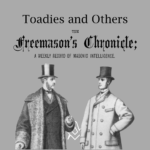 In the realm of Masonry, the principles of equality and respect are paramount. Yet, the presence of toadies—those who obsequiously seek favour from the influential—threatens these ideals. While Masonry embraces diverse beliefs and backgrounds, it rejects the sycophantic behaviours of toadies, flunkeys, and tuft-hunters, urging members to uphold genuine respect and self-worth. The Freemason's Chronicle - 22nd January 1876 |
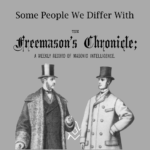 Unveiling the Unpleasant: Some People We Differ With Discover the intriguing dynamics of quarrels within the Masonic brotherhood. From the cantankerous to the litigious, the peevish to the vengeful, delve into the characters that challenge fraternal harmony. Explore their motives, temperaments, and the art of navigating disputes with these fascinating brethren. Brace yourself for a riveting journey into the world of conflicting personalities. |
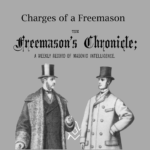 Unravelling the Masonic Mystique: A Deep Dive into the Freemasons' Charges - Explore the intricate world of Freemasonry, its principles, rituals, and the mechanisms for resolving internal disputes. Discover how this ancient fraternity fosters unity, promotes moral conduct, and upholds the sanctity of its secrets, while navigating the complexities of modern society. - The Freemason's Chronicle - 4 December 1875 |
 Unlock the hidden lessons of Masonic Studies! Don't settle for superficial knowledge or mere rituals. Discover the true depth and meaning behind Freemasonry. Expand your understanding of Tracing-Boards, Lectures, and more. Join regular Lodges of Instruction to enhance your Masonic journey. Become a knowledgeable Freemason, not just a token-bearer. Unleash the power of true Masonic wisdom today! |
 Uncover the incredible story of how Masonry saved the life of a Crimean War foot soldier in this historical and masonic account. Through the first hand experience of a soldier engaged in fierce hand-to-hand combat, witness the fateful encounter with a Russian Freemason that changed the course of his life. Learn how brotherhood and a deep dedication to the craft can lead to unforeseen and life-saving circumstances on the battlefield. |
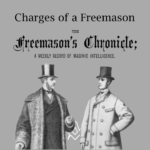 The Freemason's Chronicle - Charges of a Freemason The secrets of Masonry are the exclusive property of the Craft, and can never be communicated to one who is a mere labourer and not an accepted Mason. Hence, no labourer, that is, one who has not been regularly initiated in a legal Lodge. Article first published in The Freemason's Chronicle, 27 November 1875 |
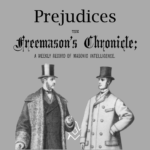 The Freemason's Chronicle - Prejudices Prejudices are partial judgments in favour of, or against certain persons or things, and, for convenience sake, may be ranged in two categories—those which are, comparatively speaking, harmless, and those which are harmful. Article first published in The Freemason's Chronicle, Oct. 2 1875. |
 The Freemason's Chronicle - Cliques Is Freemasonry - a Clique ? Man has been defined as a gregarious animal, but in his highly civilised condition he is gregarious only to a limited extent. First published in The Freemason's Chronicle, Oct. 2 1875, addresses the same challenges then as now. |
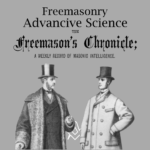 The Freemason's Chronicle - Freemasonry - an Advancive Science Is Freemasonry - an Advancive Science ? Not to confuse advancement with innovation. Has it been the case that Freemasonry's survival for 300 years plus is due to being an Advancive Science, tending to advance. First published in The Freemason's Chronicle 18 September 1875, addresses the same challenges then as now. |
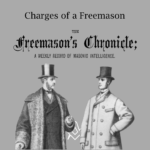 The Freemason's Chronicle - Charges Of A Freemason An interpretation of the "Charges of a Freemason", written Bro. Cornelius Moore and published in 1875, that introduce certain opinions that for some readers, will not sit well in contemporary times. - The Freemason's Chronicle, Sept. 11, 1875 |
 On The Order Of The Temple And Its Doctrine. THE Order of the Temple is divided into two great classes, denominated respectively the Order of the Temple and the Eastern Order. The Eastern Order gave birth to the Order of the Temple, and in the course of time has become an appendage of the latter. It is in ancient Egypt that we find the cradle of the Eastern Order. The Freemason's Chronicle, Sept. 4, 1875 |
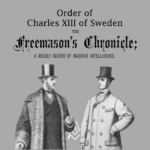 Order of Charles XIII of Sweden The following translation of the Manifesto of King JL Charles XIII of Sweden, on the occasion of his establishing the Masonic Order which bears his name, and of the Statutes of the said Order, may be interesting to our readers. The Freemason's Chronicle, Aug. 28, 1875 |
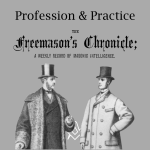 Most of our readers in the course of their experience, have doubtless met with enthusiastic brethren who take it for granted that a Mason can do no wrong. These enthusiasts are thoroughly convinced that the vast majority of those who join the Order are the most benevolent, the most moral, and the very noblest members of society. - The Freemason's Chronicle 10 July 1875 |
 An article investigating the relationship between masonry and citizenship. Are the principles of Freemasonry aligned with the freemason's claim to be a better citizen of the world? The Freemason's Chronicle - 19 June 1875 |
 A visitor must make clear his identity to the satisfaction of the Lodge he proposes to visit. More than once have we been asked to explain our views as to the reception of strangers in a Lodge. - The Freemason's Chronicle - 29 May 1875 |
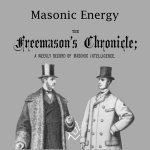 Is there reason in the accusation that Masonic energy looks only to a course of good feeds, when we can point to such grand results as have been achieved in these latter years, both in respect of the extension of our Order ? - 1May 1875 |
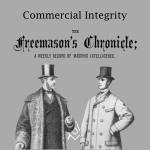 Implementing Freemasonry's peculiar system of morality in our day to day business affairs was the topic of this article, Commercial Integrity, first published in The Freemason's Chronicle - 8 May 1875 |
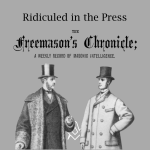 Ridicule has been somewhat illogically described as the test of truth. If it were so, Freemasonry ought to have perished long since. Two press reports from May 1875 covering the |
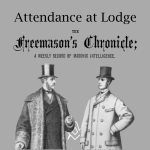 There are many things which Freemasonry will do for a man in the way of opening his mind and giving him larger and kindlier views of life, but Freemasonry itself, cannot eradicate the natural bias of the disposition. |
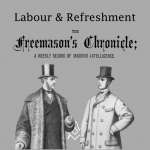 There is, we fear, too marked a tendency in very many Lodges to hasten through its labours, with a view to entering, as soon as possible, upon the business of refreshment. - The Freemason's Chronicle 17th April, 1875 |
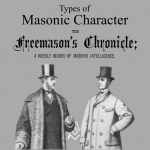 Another example that demonstrates that nothing really changes in Freemasonry. In an article the Types of Masonic Character published 145 years ago in The Freemason's Chronicle 10th April, 1875 |
 A brief history on the relationship between the British Monarchy and the craft - The Freemason's Chronicle 20th March , 1875 |
 What are the qualities of a convivial man and how does this dovetail perfectly in to Freemasonry ? 16th March, 1875 |
 A review of the "Sketch for the History of the Dionysian Artificers," a fragment, by Hyppoli to Joseph Da Costa - This little work may be regarded as, so to speak, the Holy Grail of Masonry. |
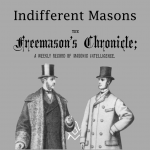 Nothing really changes, an article Indifferent Masons, From Le Monde Maçonnique 1874. Translation published in The Freemason's Chronicle 20th February, 1875 |
 In handling an intruder in the lodge, we endeavoured to show that a good Mason should be a gentleman, and a sincere man. The Freemason's Chronicle 20th February, 1875 |
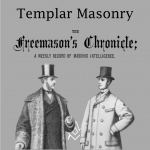 Templar Masonry - a historical aspect of the Religious and Military Order of the Temple published in The Freemason's Chronicle 13th February, 1875 |
 Secrecy perhaps the strongest objection urged by the enemies of the Masonic Order against its existence published in The Freemason's Chronicle 20th March 1875 |
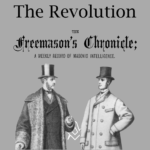 Freemasonry In The United States during And After The Revolution We take a look at Freemasonry in the United States during and after the Revolution first published in The Freemason's Chronicle - February 6, 1875 |
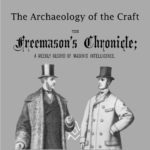 We take a look at the archaeological connection with the Craft, first published in The Freemason's Chronicle - January 30, 1875 |
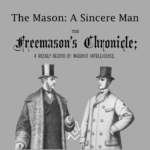 What it means to a Freemason to be a sincere man. Extract: first published in The Freemason's Chronicle - January 23, 1875 |
 What it means to a Freemason to be a citizen of the world ? First published in The Freemason's Chronicle - January 16, 1875 |
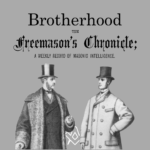 Brotherhood! In that one word what sympathetic associations arise. First published in The Freemason's Chronicle - January 9, 1875 |
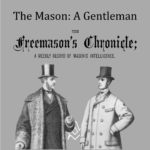 This opening article was written 145 years ago, yet it resonates with Freemasons today as it did then. First published in The Freemason's Chronicle, January 2, 1875, Issue 1 |
masonic knowledge
to be a better citizen of the world
share the square with two brothers

click image to open email app on mobile device






